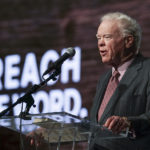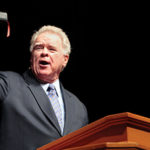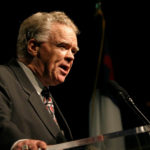Posted 6/19/03
Patterson to be nominated as
president of Southwestern Seminary
By Mark Wingfield
Managing Editor
FORT WORTH–Paige Patterson will be nominated as president of Southwestern Baptist Theological Seminary in a called meeting of seminary trustees June 24.
A seminary spokesman confirmed to the Fort Worth Star-Telegram and the Dallas Morning News that Southwestern's trustees have been called to a special meeting in Fort Worth June 24.
| Paige Patterson |
Patterson, president of Southeastern Baptist Theological Seminary in Wake Forest, N.C., confirmed to the Morning News that he is the candidate and will be in Fort Worth for the meeting. The Star-Telegram reported that Patterson previously met with the presidential search committee two weeks ago.
The Star-Telegram article quotes several sources close to Southwestern and Southeastern praising Patterson as the right person for the job and indicating he is the candidate.
Patterson would succeed Ken Hemphill, who is leaving to accept a newly created position in Nashville, Tenn., as national strategist for the Southern Baptist Convention's Empowering Kingdom Growth emphasis.
Hemphill and other seminary leaders have denied previous reports that Hemphill was pressured to leave the seminary presidency. However, numerous sources related to the seminary have told the Baptist Standard, the Star-Telegram and the Morning News that Hemphill was forced to leave by a group of fundamentalist trustees acting in concert with other SBC leadership.
Sign up for our weekly edition and get all our headlines in your inbox on Thursdays
Trustees reportedly have wanted a stronger personality at the helm who will sweep out all faculty deemed not in agreement with the SBC's fundamentalist theology and conservative politics.
Patterson is viewed as an ideal choice for the task, because he was one of two architects of the so-called “conservative resurgence” that has reshaped the SBC since 1979. Along with Paul Pressler of Houston, Patterson sounded an alarm about alleged liberalism in SBC schools and agencies, rallying busloads of messengers to SBC annual meetings to elect a string of ultra-conservative presidents. Those presidents in turn influenced the selection of trustee boards.
Supporters of that conservative movement hail Patterson as a defender of the faith.
“Dr. Patterson is one of the heroes of our denomination,” Southwestern trustee Lolley Cogswell of Sherman told the Star-Telegram.
Bob Pearle, pastor of Birchman Baptist Church in Fort Worth, told the newspaper Patterson would be an excellent choice at Southwestern.
Likewise, former SBC President Tom Elliff of Del City, Okla., commended Patterson as a proactive, visionary leader and told the Star-Telegram: “It would not surprise me if the committee chose him.”
The Morning News quoted former SBC President James Merritt of Atlanta: “I don't think you could find a finer man to lead any educational institution than Dr. Paige Patterson.”
Patterson twice was elected president of the SBC, and he has been credited with pulling Southeastern Seminary out of a near-death spiral. In 11 years there, he not only stopped an exodus of students but grew student enrollment from 700 to 2,400.
If Patterson comes to the Texas post, it would be a homecoming of sorts–and a symbol of how the Baptist landscape has changed.
Patterson is a native Texan. His father, T.A. Patterson, was executive director of the Baptist General Convention of Texas from 1961 to 1973.
After earning an undergraduate degree at Hardin-Simmons University in Abilene, a BGCT-affiliated school, Patterson left Texas to attend New Orleans Baptist Theological Seminary in Louisiana.
He returned to Texas as a pastor and educator, serving as president of the Criswell Center for Biblical Studies, which today is Criswell College. The Bible college was started out of First Baptist Church of Dallas and was considered a more conservative alternative to BGCT-related schools or SBC seminaries, including nearby Southwestern.
From his post at Criswell, Patterson launched the crusade to turn the SBC in a more conservative direction.
Relations between Southwestern and the BGCT, once highly cordial and cooperative, have grown strained in recent years as the SBC has pushed for more doctrinal conformity. One key area of disagreement is the SBC's new faith statement, drafted during Patterson's tenure as convention president. Southwestern and other SBC seminaries require faculty to sign the Baptist Faith & Message 2000, a document the BGCT has refused to endorse.
If Patterson takes the helm at Southwestern, the choice facing Texas Baptist churches will become clearer than ever, predicted David Currie, executive director of Texas Baptists Committed, an organization that has sought to keep the BGCT free of SBC-style fundamentalism.
“There's one good thing I can see, but it's selfish,” Currie admitted. “It probably guarantees the existence of Texas Baptists Committed 15 more years.”
Patterson “obviously will bring a much more hard-line fundamentalism to Southwestern,” he said.
“It just clarifies for Texas Baptists that everybody ultimately is going to have to decide” if they will follow the SBC's current theology or not, said Currie, who praised two BGCT-affiliated seminaries as more palatable alternatives.
The battle for Texas will be fought on the local level as churches choose between pastors and staff members educated at Southwestern or at more BGCT-friendly schools like Baylor University's Truett Seminary and Hardin-Simmons University's Logsdon School of Theology, Currie said.
“Texas Baptists Committed has got to be more aggressive in explaining why fundamentalism is not” the right choice, he said. “This means that Truett and Logsdon need to quadruple their efforts at recruitment so they are supplying more pastors to Texas than Southwestern.”
Currie places the responsibility for educating Texas Baptist churches about this choice squarely on the shoulders of their pastors.
“Every pastor that's not a fundamentalist should be explaining to their church why fundamentalism is wrong and why they don't want to call a fundamentalist as pastor,” he urged. “But that's not happening. It's the biggest problem we have–pastors not educating their churches. … Pastors have got to show courageous leadership and educate their people.”
While Currie said he disagrees with Patterson on theology, he expressed admiration for Patterson's political skills.
“He is a good thinker and he presents their case in a sellable fashion,” Currie said.














We seek to connect God’s story and God’s people around the world. To learn more about God’s story, click here.
Send comments and feedback to Eric Black, our editor. For comments to be published, please specify “letter to the editor.” Maximum length for publication is 300 words.